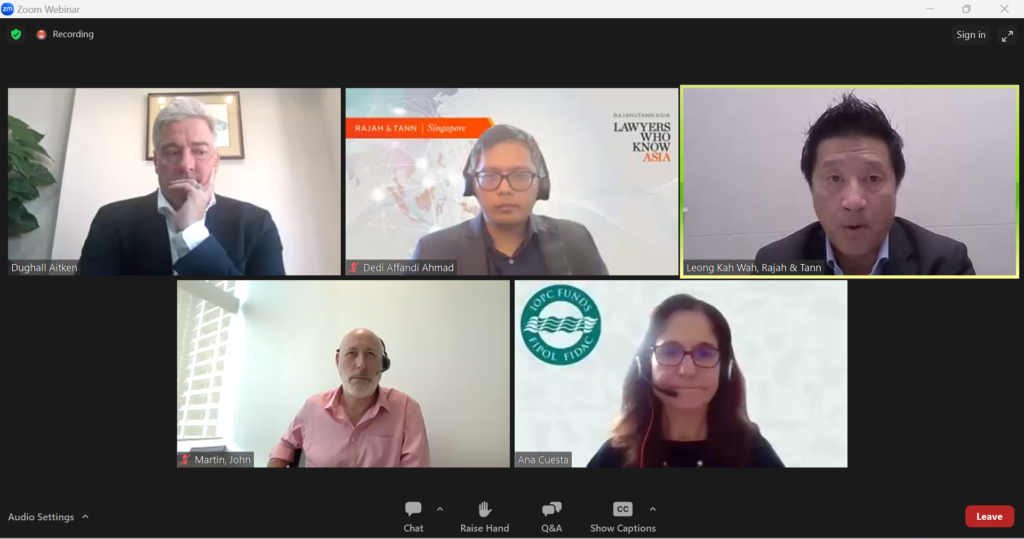
The “Managing the Aftermath of Oil Spills” webinar was well-attended by more than 150 SSA members, and featured a panel of prominent experts, including Dughall Aitken, Chief Executive of Spica Services, John Martin, CEO of Gard, Dedi Affandi, Rajah & Tann Partner and maritime lawyer and Ana Cuesta, Claims Manager at International Oil Pollution Compensation Funds (IOPC Funds). Moderated by Mr. Leong Kah Wah, Chair of the Legal and Insurance Committee of SSA, the webinar delved into crucial topics such as types of claims, economic losses, and the legal frameworks governing liability.
Key Insights from Industry Experts
Firstly, Dughall Aitken discussed the pivotal role of a P&I club correspondent in managing oil spills. His presentation highlighted the importance of understanding the extent of the spill, coordinating with agencies and authorities, and gathering evidence. Effective coordination significantly impacts the ability to settle claims, and Aitken emphasised the necessity of meticulous claim presentation.
Next, John Martin covered the scope of international P&I clubs’ coverage for oil pollution, and how they would assist their members for such claims. He provided insights into the 1992 Civil Liability Convention (CLC) and its ‘first-tier claims’ application in such incidents and its interplay with the bunker convention. Martin’s presentation underscored the importance of early intervention in minimising environmental damage.
Dedi Affandi’s presentation focused on the usual claims arising from oil spills under the Singapore Law regime. He explained the polluter pays principle, limitations of civil liabilities based on tonnage and the procedure for establishing a limitation fund. Affandi also addressed the handling of claims against this fund, shedding light on the legal nuances shipowners must navigate in oil spill incidents.
Lastly, Ana Cuesta further elaborated various claims tiers under the international scheme, including the IOPC 1992 Fund Convention. This is especially assuring for members who are dealing with only a smaller limitation in Singapore, and there is a recourse to a higher level of compensation. She discussed the types of claims under oil pollution damage, the applicable law for proof and verification, and the adjudication process. Monsalve emphasised the importance of understanding the distribution of priorities in compensation claims and the importance of the IOPC Funds in managing large-scale oil spill incidents.
Singapore’s Readiness in Managing Oil Spill Incidents and Impact To Businesses
Chair of SSA’s Legal and Insurance Committee, Mr. Leong Kah Wah shared that, “In a busy port like ours, shipping casualties with the risk of oil pollution are unavoidable. When it happens, Singapore’s readiness to handle oil pollution is important. Dughall Aitken covered the operational aspects, including the prompt activation and response of the agencies, authorities and resources involved. Dedi Affandi dealt with the Singapore legal position on claims, limitation based on the CLC, as well as potential criminal liability. John Martin explained the role of a P&I club in providing essential insurance coverage for the liabilities, early intervention in minimising the damage to the environment as well as the reinsurance afforded by the IG group of P&I clubs. Lastly, we have Ana Cuesta sharing the further tiers of compensation from the IOPC funds, should the CLC limitation be insufficient to pay claims. It is certainly reassuring to the maritime community that should oil pollution occur, and as recent events have shown us, Singapore is ready.”
Mr. Leong also underscored that claims can be “long drawn and complicated,” highlighting the necessity of thorough preparation. He aptly noted, “Preparation is quite key,” stressing the importance of maintaining comprehensive documentary evidence throughout the process”.
He urged attendees to start collecting and preserving evidence promptly, if they haven’t done so already, to navigate the intricate claims process effectively.
Essential Legal Frameworks and Guides for Oil Pollution Claims
The Merchant Shipping (Civil Liability and Compensation for Oil Pollution) Act 1998 and the International Fund for Compensation for Oil Pollution Damage (FUND) are key legal frameworks in managing oil spills.
SSA members may also refer to the ITOPF Technical Information Paper 15 which provides comprehensive guidance on preparing and submitting claims related to oil pollution. For more information, members may refer to circular (SSA/071/24/EML): https://www.ssa.org.sg/news-publications/ssa-circular/.
“Singapore’s readiness to handle oil pollution is important. It is certainly reassuring to the maritime community that should oil pollution occur, and as recent events have shown us, Singapore is ready.”
Mr. Leong Kah Wah, Partner and Senior Accredited Specialist in Maritime and Shipping Law from Rajah & Tann Singapore LLP